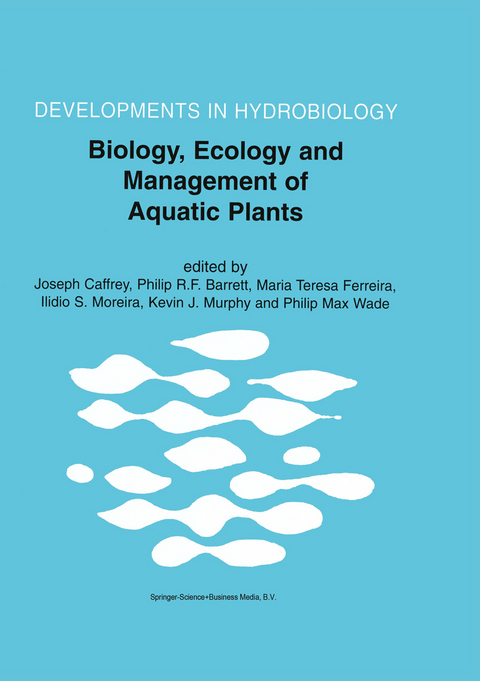
Biology, Ecology and Management of Aquatic Plants
Springer (Verlag)
978-0-7923-6182-4 (ISBN)
This series of papers from over 20 different countries was generated from the tenth in the highly successful series of European Weed Research Society symposia on aquatic plant management, this being the tenth. It provides a valuable insight into the complexities involved in managing aquatic systems, discusses state-of-the-art control techniques and deals with patterns of regrowth and recovery post-management. Careful consideration is given to the use of chemicals, a practice which has come under scrutiny in recent years. Underpinning the development of such control techniques is a growing body of knowledge relating to the biology and ecology of water plants. The authorship of the papers represents the collective wisdom of leading scientists and experts from fisheries agencies, river authorities, nature conservation agencies, the agrochemical industry and both governmental and non-governmental organisations.
Propagule bank and plant emergence of macrophytes in artificial channels of a temperate irrigation area in Argentina.- Modelling Potamogeton pectinatus: for better or for worse.- Effects of Cyprinus carpio on Potamogeton pectinatus in experimental culture: the incidence of the periphyton.- Survival strategy of Pistia stratiotes L. in the Djoudj National Park in Senegal.- Comparative ecology of Monochoria korsakowii and M. vaginalis.- Competition between three submerged macrophytes, Elodea canadensis Michx, Elodea nuttallii (Planch.) St John and Lagarosiphon major (Ridl.) Moss.- Metals in sediment and water of three reed (Phragmites australis (Cay.) Trin. ex Stend) stands.- Heavy metal content of common reed (Phragmites australis (Cay.) Trin, ex Steudel) and its periphyton in Hungarian shallow standing waters.- Gas transfer in wetland plants controlled by Graham’s law of diffusion.- Aquatic plants in the rice fields of the Tagus Valley, Portugal.- Plant communities of the lagoons of the Portuguese Coastal Superdistrict — a multivariate approach.- The use of isozymes and PCR-based DNA polymorphism in aquatic weed management: a case-study on introduced and native clones of a hybrid complex.- Methodologies for surveying plant communities in artificial channels.- Interrelations of river ship traffic with aquatic plants in the River Nile, Upper Egypt.- River plants from an Iberian basin and environmental factors influencing their distribution.- Macrophyte cover and standing crop in the River Scorff and its tributaries (Brittany, northwestern France): scale, patterns and process.- Relationships of some ecological factors with the associations of vegetation in British rivers.- Distribution of the morphological groups of aquatic plants for rivers in the U.K..- Macrophytefunctional variables versus species assemblages as predictors of trophic status in flowing waters.- Vegetation dynamics in a fishpond littoral related to human impact.- Aquatic macrophyte distribution in relation to water and sediment conditions in the Itaipu Reservoir, Brazil.- Influence of water level fluctuation on the structure and composition of the macrophyte vegetation in two small temporary lakes in the northwest of Spain.- Environmental factors related to the establishment of algal mats in concrete irrigation channels.- Invertebrate hydraulic microhabitat and community structure in Callitriche stagnalis Scop. Patches.- Habitat conditions of nymphaeid associations in Poland.- Classification of Danube Delta lakes based on aquatic vegetation and turbidity.- The distribution in bankside habitats of three alien invasive plants in the U.K. in relation to the development of control strategies.- Azolla filiculoides Lamarck (Pteridophyta: Azollaceae), its status in South Africa and control.- Loss of native aquatic plant species in a community dominated by Eurasian watermilfoil.- Spartina patens as a weed in Galician saltmarshes (NW Iberian Peninsula).- Phenology and long-term control of Heracleum mantegazzianum.- Aquatic weeds and their management in Portugal: insights and the international context.- Integrated submerged aquatic vegetation management in an urban New Zealand river.- Succession of Egeria densa in a drinking water reservoir in Morbihan (France).- Typha control efficiency of a weed-cutting boat in the Lac de Guiers in Senegal: a preliminary study on mowing speed and re-growth capacity.- Aquatic plant management: ecological effects in two streams of the Swiss Plateau.- Submerged macrophyte control with herbivorous fish in irrigation channels of semiarid Argentina.- Lysathia n.sp. (Coleoptera: Chrysomelidae), a host-specific beetle for the control of the aquatic weed Myriophyllum aquaticum (Haloragaceae) in South Africa.- Fate of dichlobenil in the River Ivel. 1: Determination of the residues of dichlobenil in sediment and water.- Fate of dichlobenil in the River Ivel. 2: Effects of dichlobenil residues on hydroponically grown lettuce.- Resistance of Alisma plantago aquatica to sulfonylurea herbicides in Portuguese rice fields.- Ecology, distribution and chemical control of Hydrocotyle ranunculoides in the U.K..- Chemical control of common reed (Phragmites australis) by foliar herbicides under different spray conditions.- Effect of prior common reed (Phragmites australis) cutting on herbicide efficacy.- Long-term algal control in a reservoir using barley straw.- Filamentous algal control using barley straw.- Preliminary observations on the control of algal growth by magnetic treatment of water.- Biomass characterization on Azolla filiculoides grown in natural ecosystems and wastewater.- Residual effects of herbicide-treated Eichhornia crassipes used as a soil amendment.- A simple model for evaluating the costs and benefits of aquatic macrophytes.
| Erscheint lt. Verlag | 29.2.2000 |
|---|---|
| Reihe/Serie | Developments in Hydrobiology ; 147 |
| Zusatzinfo | IX, 341 p. |
| Verlagsort | Dordrecht |
| Sprache | englisch |
| Maße | 210 x 297 mm |
| Themenwelt | Naturwissenschaften ► Biologie ► Botanik |
| Naturwissenschaften ► Biologie ► Limnologie / Meeresbiologie | |
| Naturwissenschaften ► Biologie ► Ökologie / Naturschutz | |
| ISBN-10 | 0-7923-6182-2 / 0792361822 |
| ISBN-13 | 978-0-7923-6182-4 / 9780792361824 |
| Zustand | Neuware |
| Haben Sie eine Frage zum Produkt? |
aus dem Bereich


